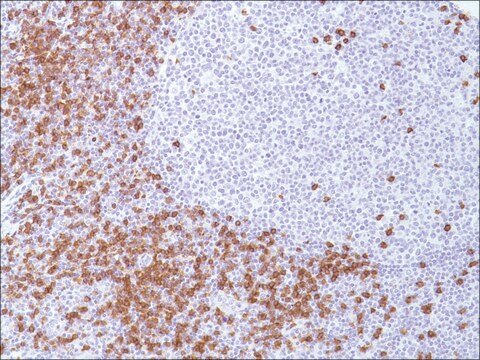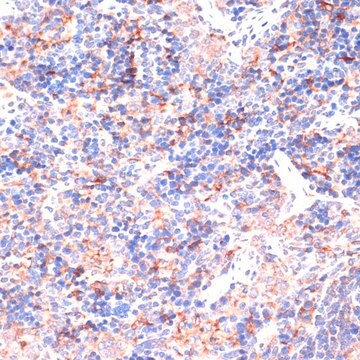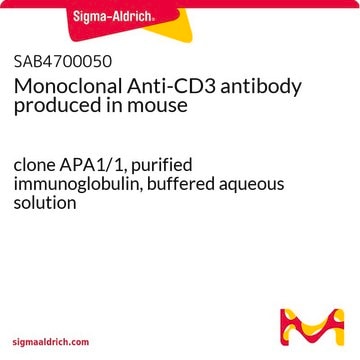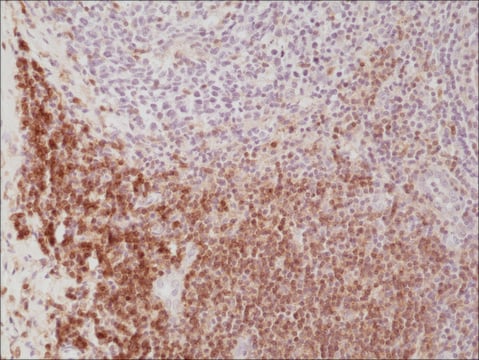SAB5500064
Anti-CD4 antibody, Rabbit monoclonal
recombinant, expressed in proprietary host, clone SP35, affinity isolated antibody
Szinonimák:
Anti-CD4mut, Anti-IMD79, Anti-OKT4D
Bejelentkezésa Szervezeti és Szerződéses árazás megtekintéséhez
Összes fotó(2)
About This Item
UNSPSC kód:
12352203
NACRES:
NA.41
konjugátum:
unconjugated
application:
FACS
IHC
IHC
klón:
SP35, monoclonal
faj reaktivitás:
human (tested)
citations:
10
technika/technikák:
flow cytometry: 1:100
immunohistochemistry: 1:50
immunohistochemistry: 1:50
Javasolt termékek
biológiai forrás
rabbit
Minőségi szint
rekombináns
expressed in proprietary host
konjugátum
unconjugated
antitest forma
affinity isolated antibody
antitest terméktípus
primary antibodies
klón
SP35, monoclonal
faj reaktivitás
human (tested)
faj reaktivitás (homológia által előrejelzett)
pig
technika/technikák
flow cytometry: 1:100
immunohistochemistry: 1:50
izotípus
IgG
UniProt elérési szám
kiszállítva
wet ice
tárolási hőmérséklet
2-8°C
célzott transzláció utáni módosítás
unmodified
Géninformáció
human ... CD4(920)
Related Categories
Általános leírás
CD4, a single chain transmembrane glycoprotein, is found on a T cell subset (helper/inducer) representing 45% of peripheral blood lymphocytes. It is also present on 80% of thymocytes and at a lower level on monocytes. It is involved in recognition of antigen presented along with MHC class II by APCs. It serves as receptor for HIV and is expressed in T cell lymphomas. Non-specific nuclear staining is sometimes seen in follicles with this antibody; however in most cases it does not interfere with the interpretation of the CD4 membrane staining.
Immunogén
Synthetic peptide corresponding to internal region of human CD4.
Tulajdonságok és előnyök
Evaluate our antibodies with complete peace of mind. If the antibody does not perform in your application, we will issue a full credit or replacement antibody. Learn more.
Fizikai forma
0.1 ml rabbit monoclonal antibody purified by protein A/G in PBS/1% BSA buffer pH 7.6 with less than 0.1% sodium azide.
Jogi nyilatkozat
Unless otherwise stated in our catalog or other company documentation accompanying the product(s), our products are intended for research use only and are not to be used for any other purpose, which includes but is not limited to, unauthorized commercial uses, in vitro diagnostic uses, ex vivo or in vivo therapeutic uses or any type of consumption or application to humans or animals.
Nem találja a megfelelő terméket?
Próbálja ki a Termékválasztó eszköz. eszközt
Tárolási osztály kódja
10 - Combustible liquids
WGK
WGK 2
Lobbanási pont (F)
Not applicable
Lobbanási pont (C)
Not applicable
Válasszon a legfrissebb verziók közül:
Már rendelkezik ezzel a termékkel?
Az Ön által nemrégiben megvásárolt termékekre vonatkozó dokumentumokat a Dokumentumtárban találja.
Chronic hepatitis C liver microenvironment: role of the Th17/Treg interplay related to fibrogenesis.
Daniela Alejandra Rios et al.
Scientific reports, 7(1), 13283-13283 (2017-10-19)
The role of the different lymphocyte populations in liver microenvironment of chronic hepatitis C (CHC) patients is still matter of debate. Since Th17 and Treg have opposite functions, their balance could affect disease progression. The aim was to explore liver
Julie Jacobs et al.
Oncoimmunology, 7(7), e1440167-e1440167 (2018-06-15)
Cancer-associated fibroblasts (CAFs) are involved in the proliferative and invasive behavior of colorectal cancer (CRC). Nonetheless, CAFs represent a heterogeneous population with both cancer-promoting and cancer-restraining actions, lacking specific markers to target them. Expression of the immune checkpoint molecule CD70
Akihiro Kitadate et al.
Haematologica, 103(1), 126-135 (2017-10-14)
Histone deacetylase inhibitors are promising agents for various T-cell lymphomas, including cutaneous T-cell lymphoma, peripheral T-cell lymphoma, and adult T-cell lymphoma/leukemia. CCR4 is an important therapeutic target molecule because mogamulizumab, an anti-CCR4 antibody, has shown promising efficacy against various T-cell
Thomas Albrecht et al.
Cancers, 13(7) (2021-05-01)
Inhibition of the programmed cell death protein-1/ligand-1 (PD-1/PD-L1) axis has opened a new era in the treatment of solid cancers. However, there is no data on the expression and relevance of PD-L1 in Western gallbladder cancer (GBC). We assessed PD-L1
Joji Nagasaki et al.
Blood advances, 4(17), 4069-4082 (2020-09-02)
Classic Hodgkin lymphoma (cHL) responds markedly to PD-1 blockade therapy, and the clinical responses are reportedly dependent on expression of major histocompatibility complex class II (MHC-II). This dependence is different from other solid tumors, in which the MHC class I
Tudóscsoportunk valamennyi kutatási területen rendelkezik tapasztalattal, beleértve az élettudományt, az anyagtudományt, a kémiai szintézist, a kromatográfiát, az analitikát és még sok más területet.
Lépjen kapcsolatba a szaktanácsadással








